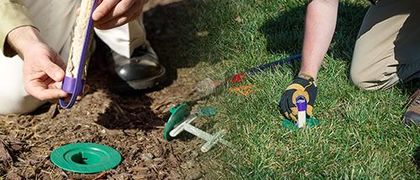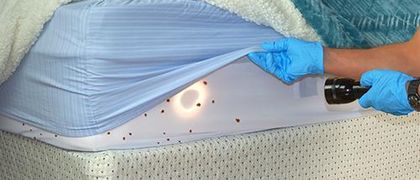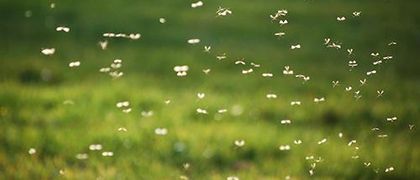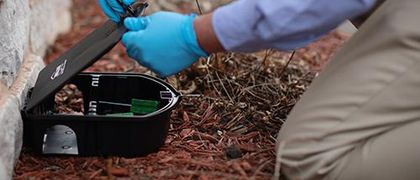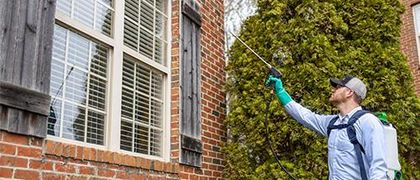Understanding Mosquito Lifecycles in Kansas City Backyards
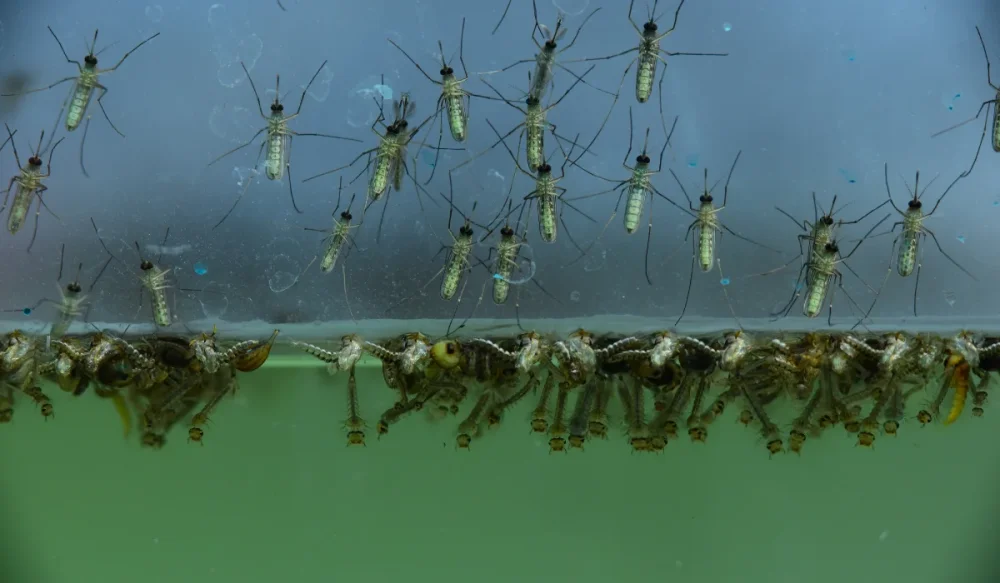
If you live in Kansas City, you’ve likely dealt with mosquitoes in your backyard at some point. They seem to appear overnight, especially after a good rain, and before you know it, you’re dealing with itchy mosquito bites and avoiding your outdoor space.
But understanding the mosquito lifecycle in Kansas City backyards can help you stay one step ahead.
Knowing when they breed and how they grow gives you the power to break the cycle before they become a serious problem.
Key Takeaways
- The mosquito lifecycle includes egg, larval, pupal, and adult stages, all of which are influenced by water and temperature.
- In Kansas City, standing water in backyards is the most significant contributor to mosquito problems.
- Interrupting the cycle early keeps mosquito populations from exploding in summer.
- Local pest control services, like Miller Pest & Termite, offer customized solutions for lasting relief.
The Mosquito Lifecycle: From Egg to Adult
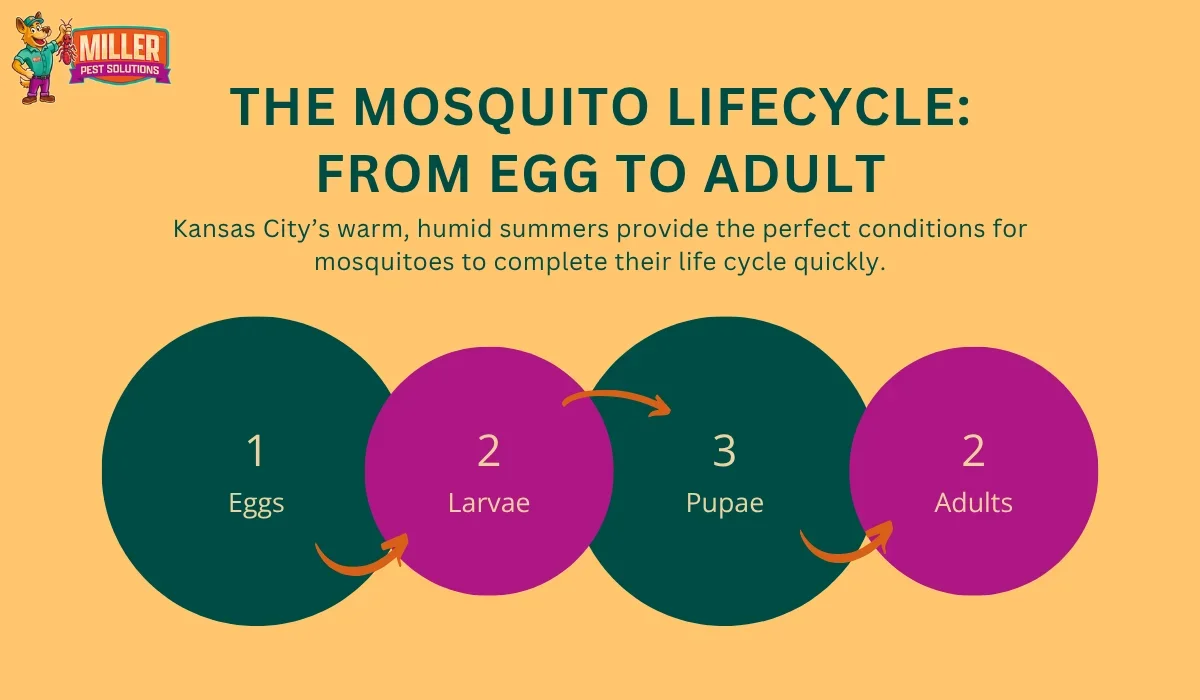
Like many insects, mosquitoes go through four distinct life stages: egg, larva, pupa, and adult. Each stage depends heavily on environmental conditions, especially standing water. Kansas City’s warm, humid summers provide the perfect conditions for mosquitoes to complete their life cycle quickly.
Eggs: The Beginning at the Water’s Surface
Female mosquitoes lay their eggs on the surface of stagnant water. You’ll find eggs in everything from flower pots and birdbaths to puddles and clogged gutters. Some species lay single eggs; others cluster them into rafts that float until they hatch. This stage can last anywhere from a few hours to several days, depending on temperature and water conditions.
Larvae: Constant Motion Below the Surface
When the eggs hatch, they develop into mosquito larvae, also known as wrigglers. These tiny creatures live in water, breathing air through small tubes at the surface. They feed on organic material in the water and molt several times as they grow. In Kansas City’s summer heat, larvae can mature in just five days, making it crucial to eliminate standing water regularly.
Pupae: The Transition Phase
After the larval stage, mosquitoes enter the pupal stage. During this time, they don’t feed but remain active, tumbling through the water if disturbed. This phase usually lasts two to three days. Once the transformation is complete, adult mosquitoes emerge from the pupal case and begin flying.
Adults: Flying, Feeding, and Breeding
Once adult mosquitoes emerge, they waste no time. Males feed on nectar, but female mosquitoes seek out blood meals to develop their eggs. These bites are not just itchy; they can also carry mosquito-borne diseases such as West Nile virus, Zika, and encephalitis. After feeding, the female locates a suitable breeding site and lays her eggs, initiating the cycle anew.
Why the Lifecycle Matters for Mosquito Control
Knowing how and when mosquitoes grow helps you interrupt the process before they reach adulthood. Controlling mosquito larvae is more effective than trying to battle swarms of adult mosquitoes. For example, homeowners can apply larvicides to water where larvae live, while fogging or misting targets adult mosquitoes.
But timing is everything. Killing mosquitoes after they’ve laid eggs means the next generation is already on its way. That’s why effective mosquito control involves prevention, not just treatment.
Breeding Grounds in Kansas City Backyards
Mosquitoes aren’t picky. Any standing water can serve as a breeding site. That includes:
- Clogged gutters
- Unused tires
- Birdbaths
- Kiddie pools
- Flower pots with drainage trays
- Open trash bins
- Areas where water collects in your landscaping
Kansas City’s mix of summer storms and humid air gives mosquitoes all the moisture they need. Add a little shade and a few warm nights, and you’ve got a perfect breeding site.
Common Mosquito Species in Missouri
In the Missouri and Kansas City area, the most common mosquito species include the Aedes, Culex, and Anopheles groups. Each behaves slightly differently:
- Aedes mosquitoes tend to bite during the day and can carry diseases such as Zika, dengue, and yellow fever.
- Culex mosquitoes are night-biters and the primary carriers of West Nile virus.
- Anopheles mosquitoes, though rare, can carry malaria in some parts of the world.
Each species has unique preferences for breeding sites and feeding times, which is why working with a professional pest control company familiar with local mosquito populations can make a big difference.
Health Risks from Mosquitoes
Mosquitoes aren’t just annoying; they’re a public health concern. Infected mosquitoes transmit diseases such as West Nile virus, encephalitis, Zika virus, and dengue fever through their bites.
While the risk is lower in Kansas City than in tropical regions, health officials have reported local cases. That makes prevention especially important during the high mosquito season, from May through September.
Mosquito Season in Kansas City
Mosquito season typically begins in early spring and peaks in summer, when temperatures and humidity are at their highest. In Kansas City, you can expect activity to ramp up by late April and continue through the first frost of the season. Removing breeding sites early in the season can help reduce mosquito populations throughout the summer.
Practical Mosquito Control Tips for Homeowners
Here’s how you can disrupt the mosquito life cycle in your backyard:
- Dump out or drain any stagnant water at least once a week.
- Keep gutters clear so water flows freely.
- Change the water in birdbaths every few days.
- Store items like buckets, tires, and toys upside down or under cover to protect them from the elements.
- Add fine mesh screens to rain barrels and water tanks.
- Use insect repellent when outdoors, especially in the evening. Products containing DEET are EPA-approved and effective.
Some people also use natural oils, such as citronella or lemongrass, but these are typically short-term solutions. For long-lasting relief, especially during mosquito season, contact professionals who offer integrated solutions.
Professional Mosquito Control Services
DIY methods only go so far. If you’re constantly battling bites or noticing breeding sites you can’t manage, it might be time to call in the pros. Miller Pest & Termite offers mosquito control services in Kansas City and nearby areas.
Simply give us a call, and our team will identify breeding grounds, treat high-risk areas, and apply mosquito treatments safely across your outdoor spaces.
From larvicides that target mosquito larvae to misting systems that reduce adult mosquitoes, we use a combination of science and strategy. And because we are local, we understand how Midwest weather affects mosquito breeding patterns.
FAQs
What do mosquito larvae look like in water?
Mosquito larvae look like tiny, wriggling worms. They often move in a jerking motion near the surface of still water. Spotting them early helps prevent outbreaks.
Can mosquitoes breed in small amounts of water?
Yes. Even a small amount of water, such as a bottle cap, can be enough for mosquitoes to lay eggs. That’s why it’s essential to check for hidden water sources after rain.
How long does it take for mosquitoes to grow from egg to adult?
In warm weather, the full mosquito lifecycle can take as little as 7–10 days. That’s why weekly yard checks are recommended.
Get Help Now!


